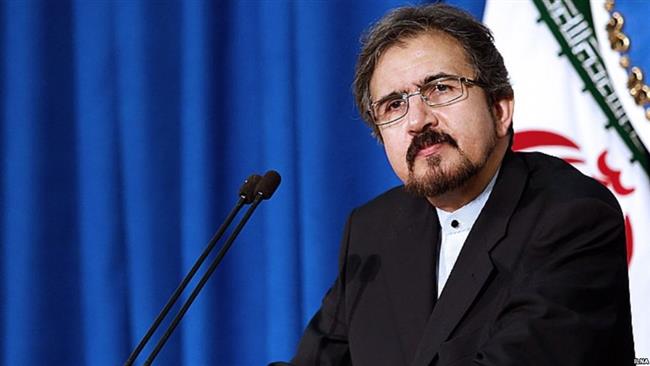
RNA - "Saudi Arabia is paving a wrong path and this is another historical mistake of Saudi Arabia that unfortunately shows that they don’t enjoy the necessary wisdom yet and it is paving a way that certain past dictators in the region have gone through and suffered a clear fate," Qassemi told reporters in his weekly press conference in Tehran on Monday.
His remarks came after the Council of (Persian) Gulf International Relations (COGIR), headed by Riyadh, urged the Persian Gulf Cooperation Council (PGCC) as well as Arab and Islamic states to expel Iran from the Organization of Islamic Cooperation (OIC) because of what it called harmful acts against Islamic unity and solidarity and its sponsoring of terrorism and promoting sectarianism.
Qassemi described Riyadh's anti-Iran moves a result of Saudi Arabia's internal problems, and said, "It is natural that Saudi Arabia makes such moves at this juncture of time."
"(But) they will not succeed and a country like Saudi Arabia cannot decide for other Arab states in the long-run and even in the mid-run," he added.
Qassemi also called on the OIC to return to its essence and role instead of sowing discord among the Islamic countries.
In relevant remarks last week, Senior Advisor to the Iranian Parliament Speaker Hossein Amir Abdollahian blamed Saudi Arabia for the inefficiency of the OIC in dealing with the Muslim World's problems.
"Saudi Arabia is responsible for the OIC's inefficacy and it has taken the organization as hostage; the holy Quds has been practically forgotten," Amir Abdollahian said.
The top advisor reacted to the OIC's recent resolution and also the organization's negligence towards the fate of the holy al-Quds which is the main reason behind setting up the OIC, and said, "The OIC has lost itself due to the interferences and pressures by Saudi Arabia."
Amir Abdollahian said that unfortunately Saudi Arabia is using the OIC as a tool, adding, "Instead of cooperation with the Muslim countries and helping to resolve the region's complicated political and security crises, it creates crises with Saudi Arabia's pressures."
He reiterated that the sudden change of the OIC secretary general shows that Saudi Arabia is moving along an unconstructive path, and said, "The OIC was established after fire breakout in the Holy al-Aqsa mosque and with the aim of focusing on holy al-Quds and confronting the aggressions of illegitimate regime of Israel, but it does not have any initiative for confronting the Zionist regime and defending the oppressed Palestinian nation."
Amir Abdollahian went on to say that Saudi Arabia will surely face defeat unless it abandons its unconstructive approach and one-sided objectives.
"The main question is what is the OIC's program for sustainable security, peace, stability and welfare of its member-states and the Muslim world; if the OIC is defeated in this way, Saudi Arabia will be solely responsible for it," he added.
The OIC Council of Foreign Ministers appointed Yusuf bin Ahmed Al-Othaimeen as the new OIC secretary general during their meeting in Mecca on November 17.
Al-Othaimeen has previously served as OIC director general of cabinet and senior advisor to the OIC secretary general.
The Organization of Islamic Cooperation, or OIC, was established in September 1969 to ensure Islamic solidarity in social, economic and political spheres. The organization has 57 member-states.
847/940